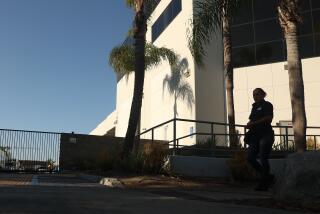The Heat Is On for County’s Furnace Repair Businesses
- Share via
Dropping temperatures have meant rising business for Ventura County heating specialists, who have been besieged by calls from people who need furnace repairs--and fast.
“You get just a tidbit of cold weather here in California, everybody’s freezing to death,” said Pat Cosgrove, service manager for Tri-County Heating & Air Conditioning in Newbury Park.
But, experts say, people expect their complicated furnaces to operate with the efficiency of a light switch.
“Everybody waits till the last moment,” said Kevin Nunn, service representative of Aire Serv Heating & Air Conditioning of Camarillo. “The furnace is out of sight, out of mind, until you need it.”
But recent problems with faulty Consolidated Industries furnaces show how risky waiting until the last minute can be. Dozens of fires in California in the last decade have been attributed to Consolidated furnaces, and the U.S. Consumer Product Safety Commission issued a warning about them in September.
The furnaces were sold under some 30 brand names, and were installed between 1984 and 1992.
Nunn’s company has found about a dozen defective furnaces in Camarillo, while Tri-County has found about 20 in the Conejo Valley. Concerned homeowners should have their furnaces inspected, but a regular maintenance schedule can spot any trouble early on, Cosgrove said.
No one would think of driving a car for years without a tuneup or an oil change, but people tend to neglect their furnaces, Cosgrove said. They should at least have their filters changed annually, she said.
“The customers seem to forget that it’s a piece of machinery,” Cosgrove said. “It should be tuned up or maintained at least once a year.”
The calls usually begin during the first cold snap, said Cosgrove, who has been in the business for 25 years. And everyone has a story as to why they should be at the top of the servicing list: there’s a newborn baby in the house; an elderly relative is visiting; there’s a party this weekend.
“Each scenario they give is they’re going to die if you don’t get there today,” she said. “People will say whatever they have to say to get you there.”
Cosgrove tries to be comforting, and she sometimes thinks she has heard every excuse.
“I’m looking for some new ones,” she said.
Most businesses try to prioritize the real crises, Nunn said. Sick and elderly people get first dibs, he said. Everyone else has to wait in line, which is pretty long right now.
“We’re running a couple of days in advance for new customers,” Nunn said.
Now, Cosgrove said, business is more than fixing furnaces. “You’re educating the public at the same time. We’re trying to target areas to advise people about the hazards.”
Technicians have also been busy servicing commercial heaters, which can inconvenience hundreds of people when they break down, said Mark Rosales, service manager of Thermo Heating, which services commercial and industrial units in Ventura and Santa Barbara counties.
“Instead of one place or one heater, you get a whole building that goes down,” Rosales said.
Like homeowners, businesses typically postpone repairs to save money. A summertime inspection might detect trouble, but who needs a heater in mid-July?
“They say, ‘Well, we’ll get to that in the wintertime,’ ” Rosales said.
Just like a car, a little tender loving care never hurts, Cosgrove said.
“If you take care of it, you’re going to have fewer breakdowns.”
FYI
Heating professionals recommend having furnaces inspected at least once a year and replacing the filters often. Here are some other furnace safety tips:
* Be sure that all furnace controls and emergency shut-offs are in proper working condition.
* Leave furnace repairs to qualified specialists. Do not attempt repairs yourself.
* Inspect the walls and ceiling near the furnace and along the chimney line. If the wall is hot or discolored, additional pipe insulation or clearance may be required.
* Check the flue pipes and pipe seams. Are they well supported and free of holes and cracks? Soot along or around seams may indicate a leak.
* Is the chimney solid? No cracks or loose bricks? All unused flue openings should be sealed with solid masonry.
* Keep trash and other combustible items away from the furnace.
Source: U. S. Fire Administration
More to Read
Inside the business of entertainment
The Wide Shot brings you news, analysis and insights on everything from streaming wars to production — and what it all means for the future.
You may occasionally receive promotional content from the Los Angeles Times.








